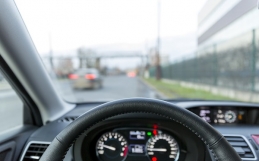Our future car-shopping options seem already to have been determined by the automotive industry: self-driving vehicles are the “next big thing.” First question: do Americans really want self-driving cars? “Some people actually like driving,” an economist from the think tank Resources for the Future told the Washington Post.
According to Jason Levine, executive director of the Center for Auto Safety, “The American people remain reticent about this leap into the future.” Writing in the Post in mid-September, Levine noted that a whopping 78 percent of American respondents to an AAA survey said they would not want to ride in a self-driving car. That’s nearly four out of five consumers. An MIT survey found even fewer (13 percent) respondents who agreed they would be comfortable with “features that completely relieve the driver of all control for the entire drive.”
Levine is also concerned about the on-the-road safety of autonomous vehicles. He cited the House of Representatives for providing exemptions for autonomous vehicles from Federal Motor Vehicle Safety Standards—a recent gift to an industry with “a history of fighting safety features.” Levine also faults the Transportation Department’s National Highway Traffic Safety Administration (NHTSA) for being negligent in safety matters: “Over the years, safety advocates (including [his] own organization) have routinely taken the NHTSA to court to force it to do its job.” Will the NHTSA step up to create regulations for autonomous vehicles?
Moreover, despite the predictions of improved safety and the potential attractions of letting your car drive itself, driverless vehicles may, in fact, be harmful to our security and wellbeing, according to a Washington Post op/ed by Robert J. Samuelson. The more digitally connected your vehicle is, the greater its vulnerability to cybercriminals. Samuelson quoted the Wall Street Journal: “Almost any digitally connected device in a car could become an entry point to the vehicle’s central communications network, opening a door for hackers to potentially take control by, for instance, disabling the engine or brakes.” These vulnerabilities are serious; it’s not an exaggeration to compare them, for example, with the recent massive hacking of the credit bureau Equifax, not to mention Russia’s proven cyber-interference with last year’s U.S. election.
Richard Manger, principal of Manger Law Firm, has extensive experience in litigation and settlements, with a focus on personal injury and workers’ compensation law. We are proud of the strong relationships of loyalty and trust we develop with our clients. We go above and beyond to achieve the best possible outcome in your case. You can contact Richard Manger via email at ram@mangerlaw.com, or by calling (336) 882-2000.




